If you are looking for the best bacon for a Keto diet (or any diet for that matter) we are here to help! Many people don't know that there are hidden sugars and preservatives in conventional bacon. If you want to get into ketosis you'll need to avoid extra sugars in bacon and other products. Taking it a step further, it's even more important to buy uncured bacon as well. This avoids ingredients that can be counterproductive to your wellness goals. To get the very best quality bacon, we recommend sugar-free, uncured, and organic bacon- or uncured organic turkey bacon. Ingredients matter!
Jump to:
Introduction
As a holistic nutrition coach, I frequently tell my clients that whether you are on a ketogenic diet or simply embracing a clean eating diet and lifestyle, in most cases you don't have to get rid of ALL of your favorite foods. Simply choose better quality ingredients and adjust the recipes accordingly.
Understandably, each individual's needs and bodies resonate differently with various foods and their ingredients. However, for the most part, it is important to consider the quality and quantity of what you are eating, and sometimes even when you choose to eat it.
Listening to your body before and after consuming certain foods is a great way to know what works for you and what may be working against you. Our bodies have so many things to tell us if we simply tune in and listen!
Bacon has been a favorite food of mine since I was a child. But when I began learning and shifting my dietary choices, I discovered which brands of bacon were a great choice and which had ingredients that didn't align with my desire for a healthy diet and lifestyle. I am here to share what I've learned!
When choosing whether or not to include crispy bacon in your diet and meal plans, it is important to consider the brand, quality, and type of bacon.
Should I buy pork bacon, turkey bacon, uncured bacon, sugar-free bacon, or simply regular bacon? It might be a bit surprising to learn of all of the different options, and ingredients that are commonly included in bacon.
Check out our clean keto guide and meal plan for beginners here!
Making Bacon
Bacon is typically crafted from pork belly, the fatty and flavorful underside of a pig. The process involves curing, smoking, and sometimes cooking.
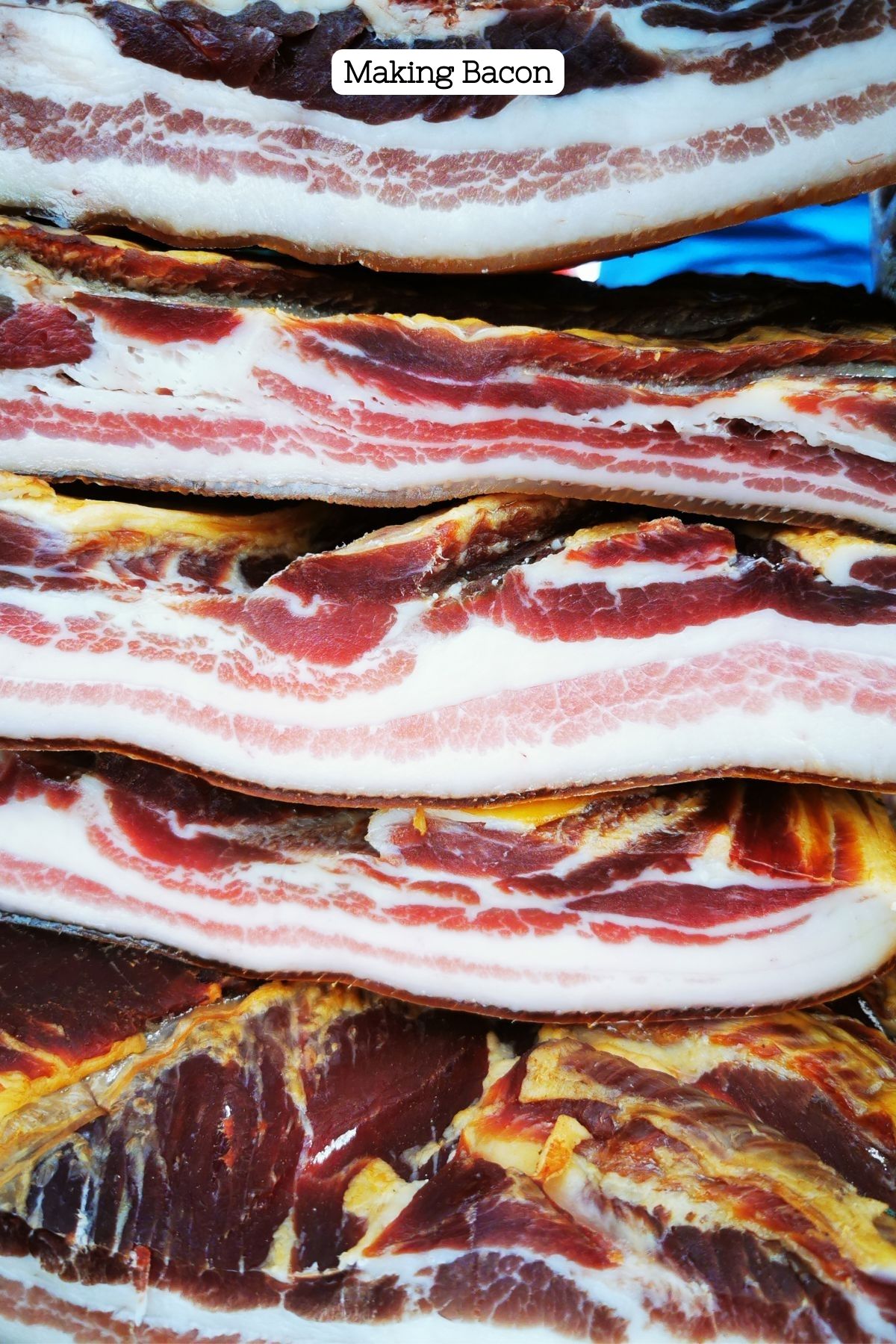
The curing process is the starting point, where the pork belly is rubbed or soaked in a mixture of salt and curing agents like sodium nitrate.
This preserves the meat, prevents bacteria, and gives bacon its characteristic pink hue.
The salt draws out moisture for preservation. Conventional bacon producers tend to use unhealthy ingredients like chemical preservatives in this process which can cause unpleasant health effects.
Additional flavorings like sugar, maple syrup, black pepper, and spices can be added during curing.
The pork belly then rests, allowing flavors to spread. With the wrong companies, these additives include genetically modified or artificial ingredients, so it is important to read the ingredients labels!
For keto dieters or those following a low carb diet, it is important to read the nutrition label to determine whether it is keto-friendly bacon or if it contains added sugar.
Smoking comes next, infusing the meat with the familiar smoky taste. The cured belly is exposed to wood smoke in a controlled environment, using woods like hickory or applewood for distinct flavors.
After smoking, the bacon may be air-dried or aged, influencing its texture and flavor.
The cured, smoked, and aged bacon is then sliced into thin or thick-cut slices of bacon for cooking. It’s commonly fried, baked, grilled, or microwaved to achieve the desired crispiness.
It's worth noting that variations in production methods exist based on regional preferences and alternatives like turkey bacon (made from turkey meat), Canadian bacon, and plant-based versions like tempeh which offer unique options. There are also many bacon products like bacon bits or crumbles, and pre-cooked bacon slices.
Types of Bacon
When it comes to bacon, there's no shortage of options available in today's diverse culinary landscape.
From traditional pork bacon to alternatives like turkey bacon and plant-based versions, each type offers its own set of nutritional attributes and considerations.
Pork Bacon
Pork bacon, the classic favorite, is made from cured and smoked pork belly. It's known for its rich, savory flavor and crispy texture.
Nutritionally, pork bacon tends to be higher in calories and saturated fats. A high-fat food, a typical serving of cooked pork bacon (around 3 strips of bacon) provides approximately 42 calories, 3.5g of fat, and 1.2g of saturated fat.
While it offers a good source of protein, vitamins, and minerals while having a high fat content.
However, with the right ingredients, animal fats are considered healthy fats that have health benefits. Read on to learn how to choose the healthiest bacon!
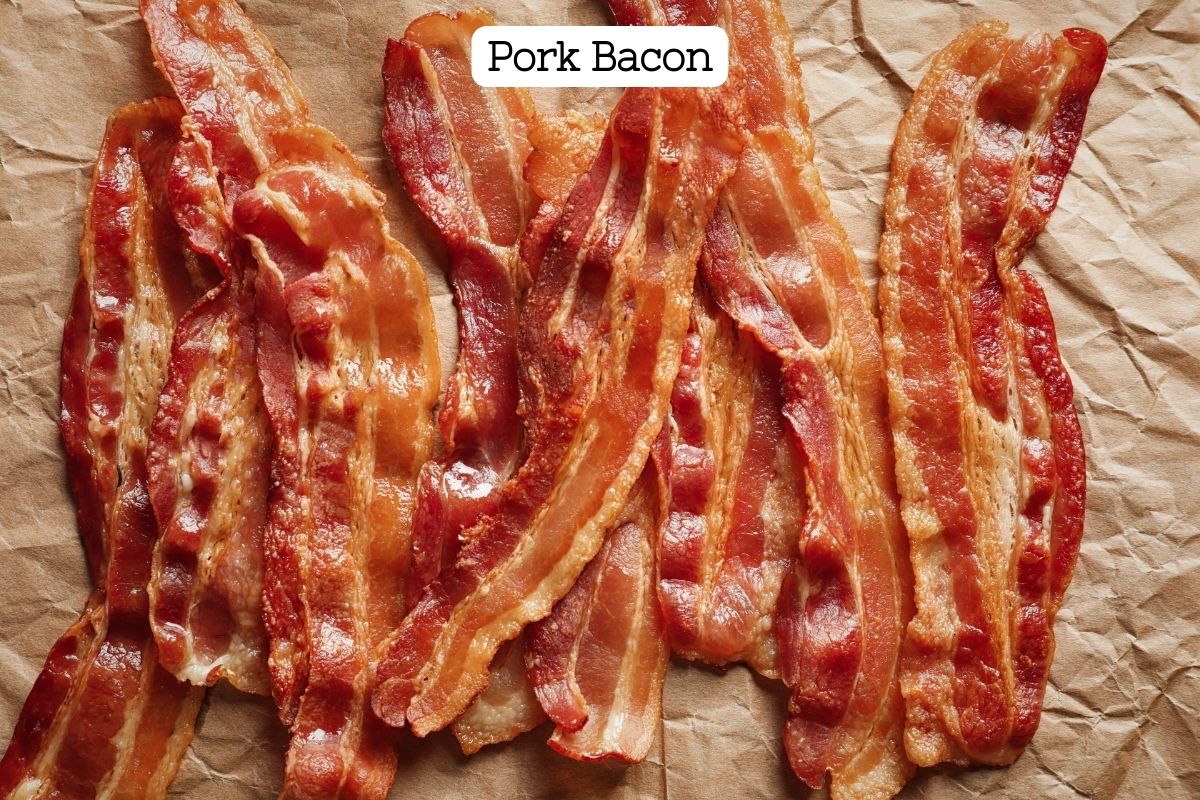
Turkey Bacon
Turkey bacon has gained popularity as a leaner alternative to traditional pork bacon. It's made from ground turkey meat, mixed with seasonings, and then formed into bacon-like strips.
Turkey bacon is lower in calories and fat compared to pork bacon. A similar serving size of cooked turkey bacon provides around 25 calories, 1.5g of fat, and 0.4g of saturated fat.
While it offers a lighter option, it's important to note that turkey bacon may also have added preservatives or sodium, so checking labels is advised.
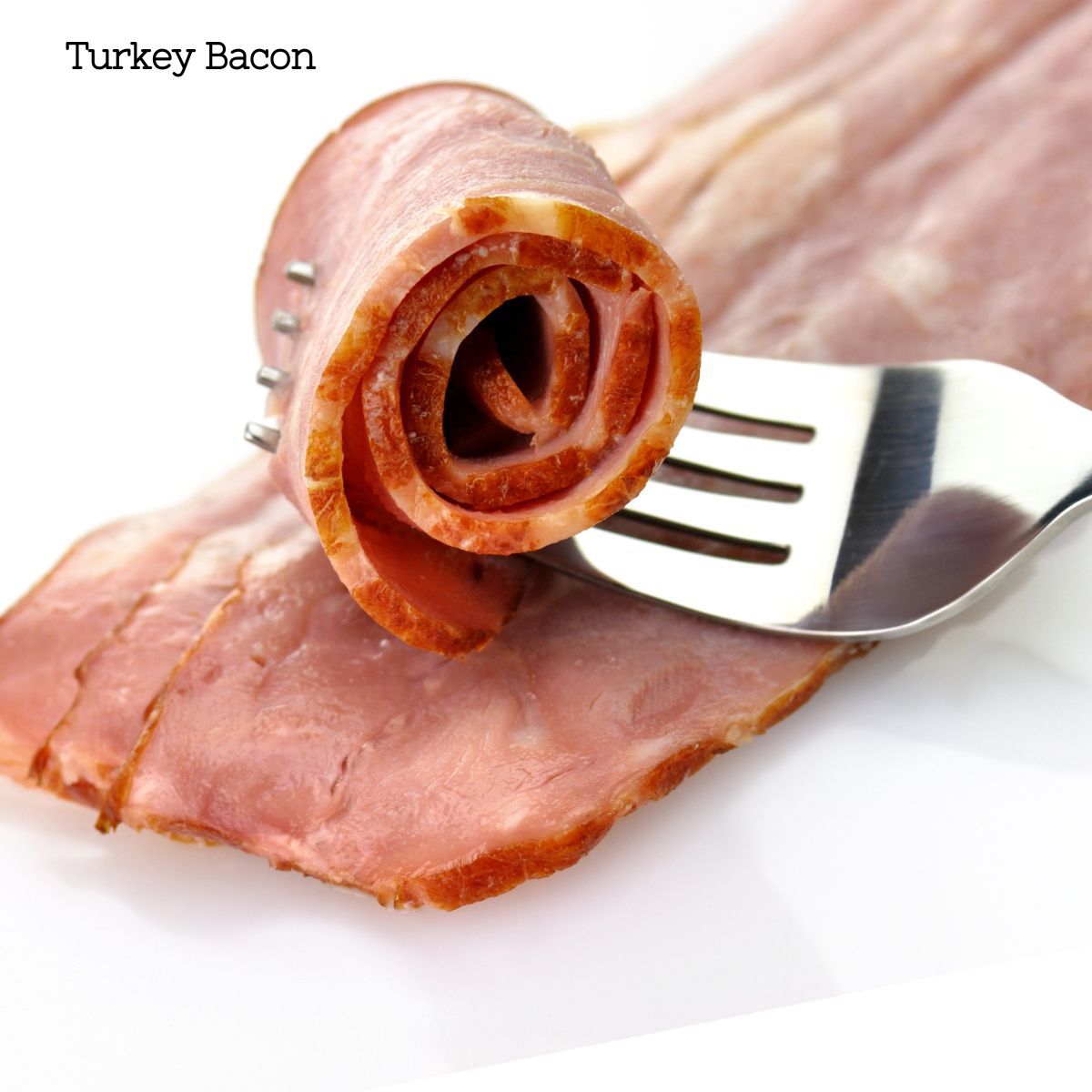
Plant-Based Bacon
Plant-based bacon is a newer addition to the bacon scene, catering to a vegan or vegetarian diet.
It's crafted from various plant sources such as tempeh, tofu, or seitan, often marinated or seasoned to mimic the smoky and savory flavors of traditional bacon.
You can even make bacon from carrots! Plant-based bacon is generally lower in calories, saturated fats, and cholesterol. Its protein content varies depending on the base ingredient.
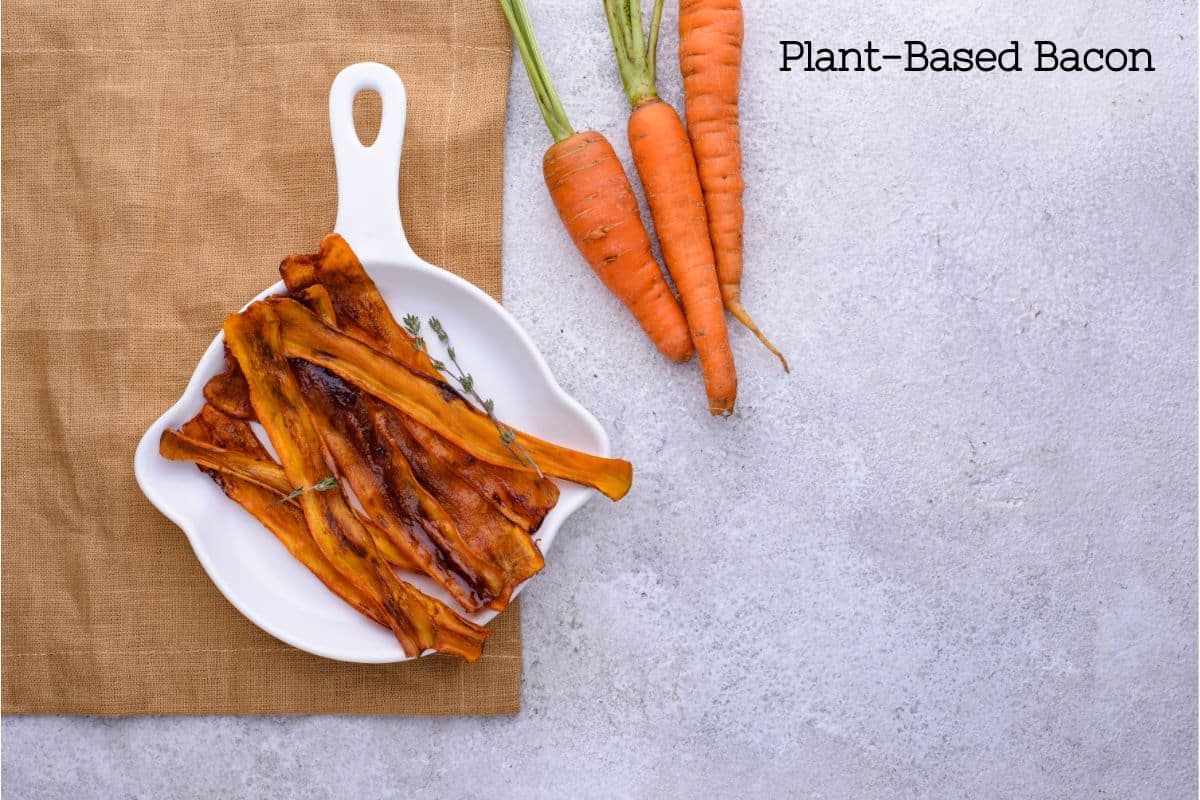
Nutrition Chart Comparison
Here's a simplified table depicting the nutritional value of different types of bacon based on the typical serving size. Keep in mind that actual nutritional values can vary based on brands and preparation methods and whether or not sugar was added.
| Nutritional Information (per 3 slices, cooked) | Pork Bacon | Turkey Bacon | Plant-Based Bacon |
|---|---|---|---|
| Calories | 120 | 75 | 90 |
| Total Fat | 9g | 5g | 5g |
| Saturated Fat | 3g | 1.5g | 0.5g |
| Cholesterol | 15mg | 15mg | 0mg |
| Sodium | 360mg | 450mg | 330mg |
| Protein | 9g | 6g | Varies |
| Dietary Fiber | 0g | 0g | Varies |
| Sugars | 0g | 0g | Varies |
| Ingredients | Pork belly, curing agents, flavorings | Ground turkey, seasonings | Plant-based ingredients, seasonings |
Please note that the values provided are approximate and can vary based on factors such as brand, portion size, thin vs thick-cut bacon, and specific ingredients used. It's important to always check the product's nutrition label for the most accurate information.
However, as you can see natural bacon is a low-carb food no matter what type you choose.
Pork and turkey have the highest cholesterol levels with pork having more grams of protein per serving than turkey.
The net carbs are not included in the chart but are typically close to zero depending on the brand.
Organic Bacon
Organic bacon embodies a commitment to superior taste and ethical consumption. Rooted in the principles of organic farming, this bacon variety starts with the cornerstone – organic pork.
Raised under humane conditions, these pigs thrive on open pastures and organic feed, resulting in better-tasting, healthier meat, free from the shadows of antibiotics or genetically modified elements.
This is important as we know in holistic nutrition that we are not only what we eat, but also what we eat eats!
And swine is notorious for eating just about anything. So if you can find organic bacon when you are searching, that will be your best bet!
Furthermore, transparency extends beyond the source. Organic standards ensure that additives, like curing agents and flavorings, adhere to the same stringent regulations.
These ingredients originate from organic sources, devoid of synthetic chemicals, offering a truly natural and unadulterated experience.
Nutritionally, organic bacon (be it pork, turkey, or otherwise) shines. Leaner and laden with healthier fats, it's a smart choice for health-conscious consumers.
Uncured Bacon vs Cured Bacon
The choice between uncured and cured bacon is key. Uncured bacon provides a healthier alternative to its cured counterpart.
The Uncured Advantage: Uncured bacon stands out for its commitment to a more natural preparation. While the term "uncured" might sound counterintuitive, it simply means that the bacon has been prepared without the use of synthetic nitrates or nitrites.
These additives are often employed in cured bacon for preservation and color enhancement and have raised concerns about potential health risks.
Natural Curing: Uncured bacon achieves its rich color and flavor through alternative methods that prioritize simplicity and natural ingredients.
One common approach involves using natural sources of nitrates, such as celery powder or sea salt, which still aid in preserving the meat.
These natural curing agents, derived from whole foods, offer a more transparent and holistic method of preparation that is less likely to cause health concerns than cured meat.
An Important Choice: Steering clear of synthetic additives is an important consideration when choosing the best brand of bacon. Uncured meat's reliance on naturally sourced curing agents and a more straightforward preparation aligns with a desire for a cleaner, less processed diet.
Common Ingredients to Avoid in Cured Bacon
When it comes to highly processed bacon, several ingredients make their way into the mix, aiming to enhance flavor, extend shelf life, and streamline production.
However, a closer look at these additives might give you pause. Here are some commonly found ingredients in highly processed bacon:
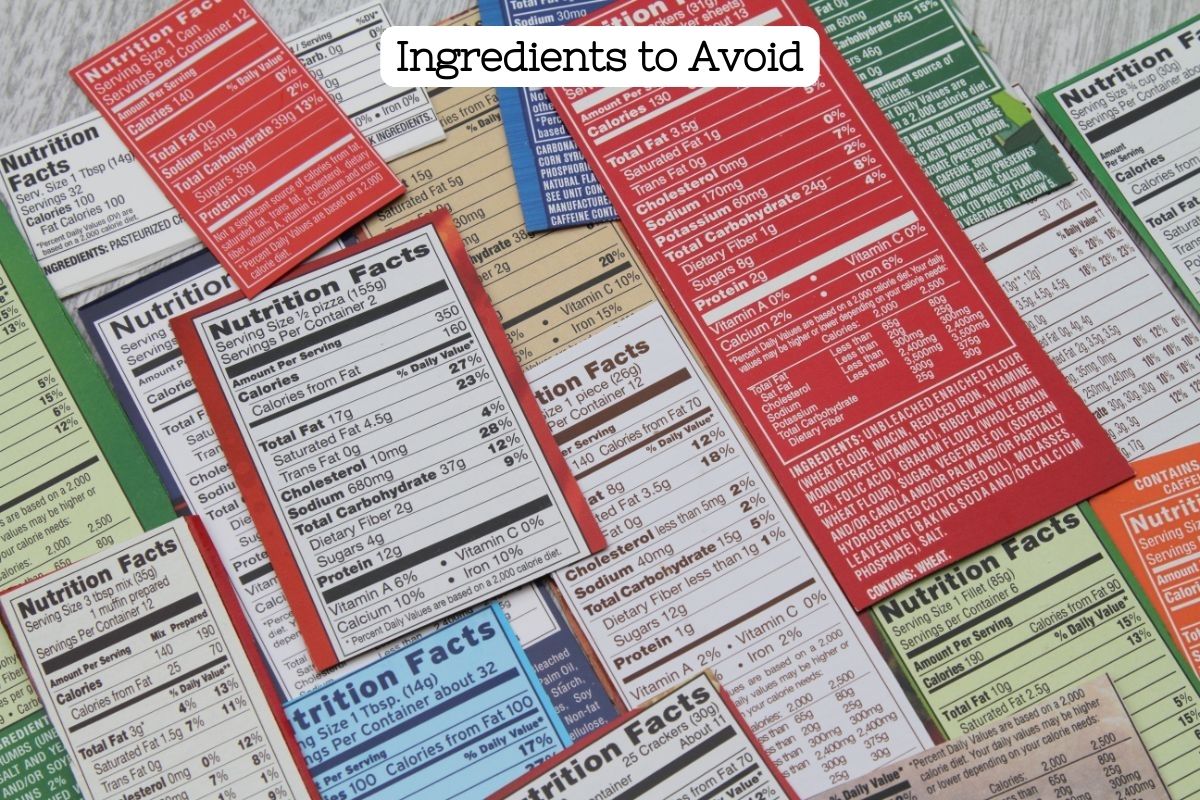
Sodium Nitrite and Sodium Nitrate
These synthetic curing agents give bacon its characteristic pink color and help preserve it. However, concerns have been raised about their potential health effects when consumed in excess.
Artificial Flavorings
These additives mimic the smoky and savory notes associated with bacon. While they enhance taste, they contribute to the highly processed nature of the product.
Sugar and High-Fructose Corn Syrup
Often added for a touch of sweetness, these sugars can increase the calorie content and contribute to an overly sweet flavor profile. The cost of these ingredients can be detrimental as there are tons of horrible ramifications to consuming HFCS.
Artificial Preservatives
Ingredients like BHA (butylated hydroxyanisole) and BHT (butylated hydroxytoluene) are used to extend shelf life, but their safety and long-term effects aren't worth it.
Monosodium Glutamate
MSG is a flavor enhancer used to intensify taste, but some individuals experience adverse reactions to it.
Hydrogenated Oils
These trans fats are used to stabilize the bacon's texture and extend its shelf life. Trans fats are known to be detrimental to heart health.
Phosphates
Antibiotics and Growth Hormones
When seeking a more wholesome bacon option, it's important to carefully read ingredient labels and consider alternatives like uncured or organic bacon.
These options often prioritize natural ingredients, avoiding synthetic additives, and excessive processing.
Sugar-Free Bacon
For those on a sugar-free diet, low-carb diet, or ketogenic diet, the quest for flavorsome yet compliant foods can be confusing at first.
Sugar-free bacon is the right option. However, this choice warrants a discerning approach to ensure you're truly reaping the benefits of a reduced-sugar lifestyle.
Why Sugar-Free
Sugar-free bacon is specially crafted to align with diets that limit sugar and carbohydrates.
By eliminating added sugars from the curing process, this bacon variety delivers that signature smoky and savory taste without the unnecessary sweet touch.
This makes it an attractive option for those striving to manage blood sugar levels or shed excess carbs and keep you in ketosis.
About Artificial Sweeteners
As you venture into the world of sugar-free bacon, it's essential to be vigilant about the use of artificial sweeteners.
Some brands may incorporate these sugar substitutes to replicate the flavor profile of traditional bacon.
However, it's important to approach these additives with caution. Research has raised concerns about health risks associated with certain artificial sweeteners, such as aspartame or sucralose.
Spotting Artificial Sweeteners
To identify the presence of artificial sweeteners in sugar-free bacon, scrutinize the ingredient label. Look for terms such as:
- Aspartame
- Sucralose
- Saccharin
- Acesulfame potassium (Ace-K)
- Neotame
- Steviol glycosides (Stevia, a natural sweetener, is a natural exception)
-Erythritol (A sugar alcohol that can cause symptoms in sensitive individuals)
While artificial sweeteners are approved for consumption by regulatory bodies, understanding their potential impact on your health and individual tolerance is vital.
Savoring Sugar-Free Bacon with Care

Incorporating sugar-free bacon into your low-carb or sugar-free regimen can indeed elevate your culinary experience.
Be sure to source products that use natural sweeteners with zero carbs avoiding artificial sweeteners if possible.
Your health journey is a holistic endeavor, and making informed choices about the foods you consume plays a significant role in your overall well-being.
As you begin to eat clean, remember that moderation, mindfulness, and a keen eye on labels can help you relish the delicious benefits of sugar-free bacon while navigating the nuanced landscape of sweeteners.
Guide to Choosing Keto-Friendly Bacon
Selecting the perfect bacon for your health-conscious ketogenic lifestyle involves thoughtful consideration of factors that align with your health goals and values. Here's a concise guide to help you make an informed choice:
Opt for Uncured and Sugar-Free: Prioritize uncured bacon, which avoids synthetic nitrates and nitrites, and consider sugar-free options to adhere to a low-carb lifestyle (without added artificial sweeteners).
Mindful Ingredients: Inspect labels for recognizable, natural ingredients. Avoid additives like artificial sweeteners, hydrogenated oils, and excessive sodium.
Organic and Natural Sources: If possible, choose bacon from organic and humanely raised pigs. This not only promotes animal welfare but may also yield higher-quality meat.
Quality Over Quantity: Lean towards bacon that uses whole food sources for flavoring and curing. Natural herbs, spices, and naturally occurring nitrates (such as celery powder) are favorable.
Portion Control: While bacon can be a flavorful addition, remember that moderation is key. Balance your intake with other nutrient-rich foods in your ketogenic diet.
Read the Label: Scrutinize ingredient labels for transparency. Be cautious of artificial additives, sweeteners, and excessive sodium content.
Personal Preference: Consider factors beyond nutrition, such as taste, texture, and ethical considerations. Your enjoyment and satisfaction matter on your health journey.
Navigating the realm of bacon for your ketogenic diet need not be overwhelming.
Armed with this concise guide, you're equipped to make a choice that not only complements your nutritional objectives but also resonates with your broader well-being.
As you savor each delicious bite, remember that informed decisions and a holistic approach pave the way for a fulfilling and health-conscious ketogenic experience.
Where to Find the Best Brands
When searching for the best bacon brands to complement your ketogenic journey, a world of options awaits. To streamline your search, consider these avenues along with your local grocery store:
Local Butcher Shops: Explore local butcher shops or specialty meat markets in your area. They often offer high-quality, artisanal bacon that aligns with your dietary preferences.
Organic and Natural Grocers: Visit organic and natural food stores, where you're more likely to find a curated selection of bacon brands that prioritize wholesome ingredients.
Online Retailers: Delve into online platforms that specialize in organic, natural, or keto-friendly products. This can grant you access to a wider array of bacon options, often with detailed ingredient information.
Farmers' Markets: Farmers' markets can be a treasure trove of fresh, locally sourced bacon options. Engage with vendors to learn about their sourcing and production methods.
Consumer Reviews: Online reviews and forums can provide insights into popular bacon brands among ketogenic enthusiasts, offering firsthand experiences and recommendations.
Keto-Focused Resources: Turn to keto-centric cookbooks, websites, and social media communities. These resources often spotlight bacon brands that harmonize with your dietary goals.
Ingredient Research: Prioritize brands that prioritize transparency in labeling. Researching ingredients can help you discern whether a brand aligns with your preferences.
Remember that the best bacon brand for your ketogenic diet is one that resonates with your taste preferences, ethical considerations, and nutritional requirements.
 Pederson’s Farms, Organic...Shop on Amazon
Pederson’s Farms, Organic...Shop on Amazon
 WHOLE FOODS MARKET Organic ...Shop on Amazon
WHOLE FOODS MARKET Organic ...Shop on Amazon
 Wellshire Farms Organic Dry...Shop on Amazon
Wellshire Farms Organic Dry...Shop on Amazon
 Applegate, Organic Uncured ...Shop on Amazon
Applegate, Organic Uncured ...Shop on Amazon
 Applegate, Organic Hickory ...Shop on Amazon
Applegate, Organic Hickory ...Shop on Amazon
 Wellshire Farms Organic Sug...Shop on Amazon
Wellshire Farms Organic Sug...Shop on Amazon
 Two Pack Organic Vegan Coco...Shop on Amazon
Two Pack Organic Vegan Coco...Shop on Amazon
Check out our web story here!
Conclusion
In the world of savory indulgence, the bacon lover's journey to finding the best option for their keto diet plan can be a flavorful exploration. From the traditional pork bacon to the lean appeal of turkey bacon and the innovative twist of plant-based alternatives, there's a spectrum of choices to cater to various preferences.
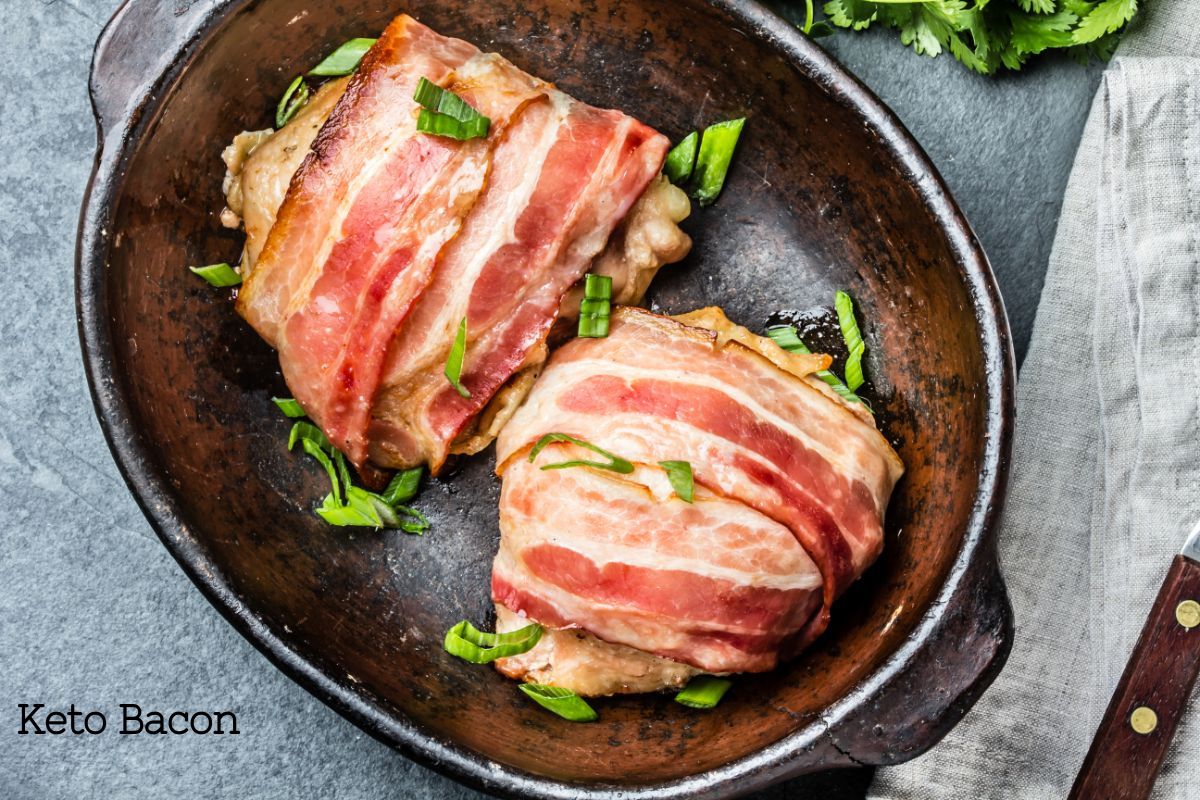
For those closely monitoring their carb intake, the allure of low-carb options aligns seamlessly with the tenets of a keto lifestyle. However, it's crucial to distinguish between the good option of wholesome, natural ingredients and the pitfalls of the so-called "dirty keto," where quality takes a back seat.
As a bacon lover, your path is nuanced – a balance between taste and health goals, mindful choices, and dietary freedom. With the right approach, you can savor the delights of bacon while embracing a low-carb, keto-friendly lifestyle that propels you toward your weight loss aspirations.
What is your favorite type of bacon? Let us know in the comments below! Don't forget to sign up for our newsletter and follow us on social media!
Have a healthy day!
Natalie

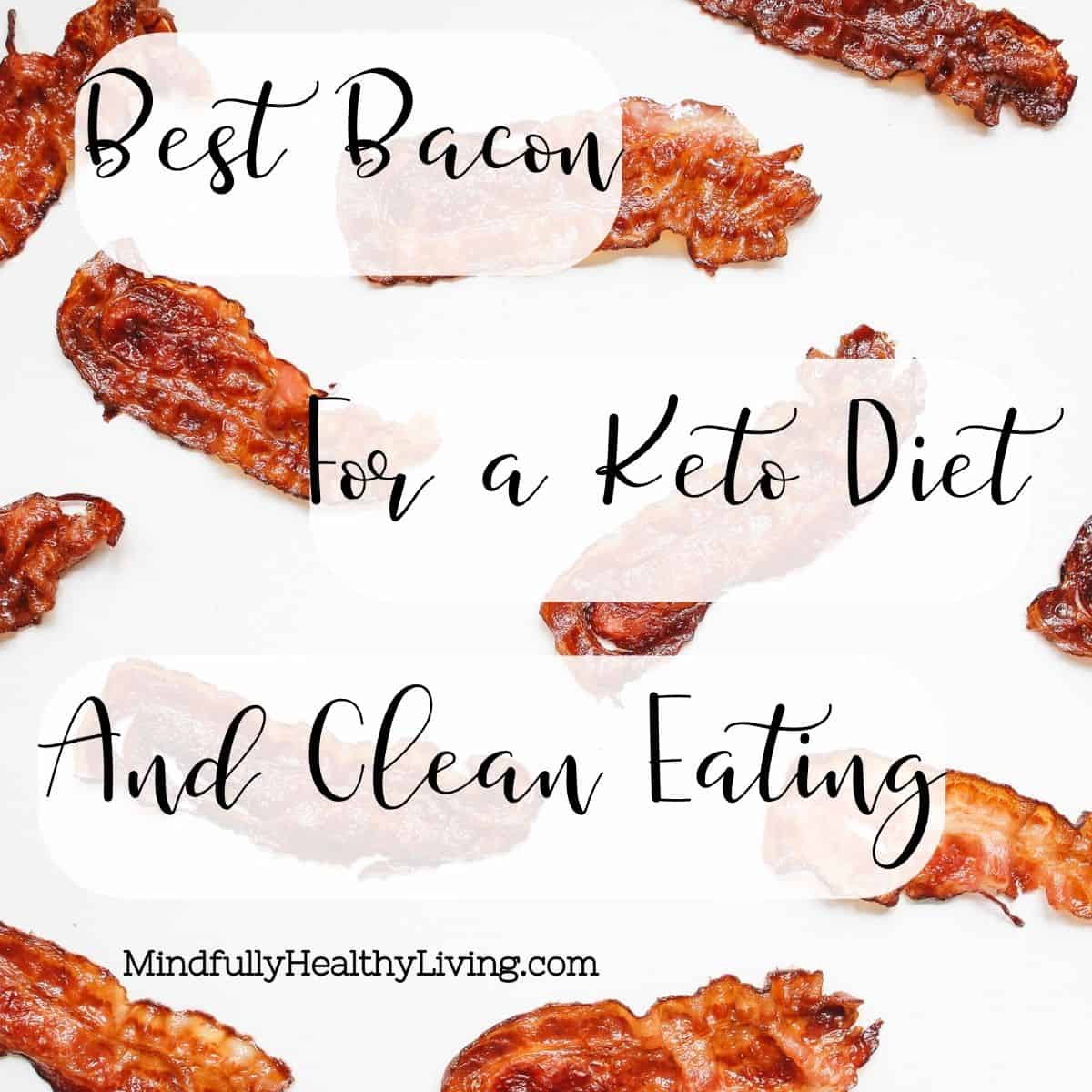





Comments
No Comments